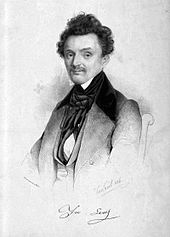Josef Rudolf Lewy
Josef Rudolf Lewy (born April 2, 1802 in Nancy , † February 19, 1881 in Serkowitz , today Radebeul ; also Josef Rudolf Lewy-Hoffmann ) was a Franco-German musician ( valve horn ) and composer . He was the younger brother of Eduard Constantin Lewy (1796-1846).
Life
Joseph Rodolphe (later Josef Rudolf or Joseph Rudolph) Lewy grew up with his older brother Eduard Constantin with his father, a cellist in the chapel of the Duke of Zweibrücken. Like his brother, he studied at the Paris Conservatory in the horn class of Frédéric Duvernoy .
His brother brought him to Basel as a violist and horn player , from where he switched to the royal chapel in Stuttgart as horn player on the recommendation of Peter Joseph von Lindpaintner . His brother, in turn, made him switch to the imperial court opera orchestra in Vienna in 1826 . There the two brothers caused a sensation through their excellent teamwork.
At the beginning of the 1830s, Josef Rudolf gave up his permanent position and traveled through Europe, so he came to Germany, England, France and Sweden, where he was honored as music director "with the fleet" in Stockholm . In 1837 Lewy was called to Dresden , where he was the first horn player in the royal orchestra under conductor Richard Wagner .
In 1851 Lewy retired and from then on lived in the " Oberlößnitz ", more precisely in the municipality of Serkowitz , today a district of Radebeul , where he expanded his name to include the maiden name of his wife Laura Caroline zu Lewy-Hoffmann. The artist's domicile was the villa at Hoflößnitzstraße 4 .
Lewy's compositions have been published by Kistner and Breitkopf & Härtel in Leipzig, and by Diabelli , Maximilian Josef Leidesdorf and Müller in Vienna. Twelve of his etudes for both the simple and the chromatic horn were praised in the Neue Zeitschrift für Musik , issue no. 50 of 1849. After Lewy's death, a number of newspapers, including musical journals, spread the news that he had invented the chromatic French horn . A false report, the author Fürstenau makes this clear in his article in the next sentence. Lewy was one of the first horn virtuosos to use the valve horn and is considered a pioneer of this new instrument. Many of his compositions are composed for the valve horn.
Works
- Grand Duo op. 6 for horn and piano
- The basket & friendship or love op. 7 - two songs for voice, horn and piano
- Divertissement op. 11 (on themes from the opera Les Huguenots by Giacomo Meyerbeer ) for horn and piano
- Morceau de Salon op.12 (on themes from the opera I puritani by Vincenzo Bellini ) for horn and piano
- Divertissement op. 13 (on themes by Franz Schubert ) for horn and piano
- 12 etudes for horn with piano accompaniment
- Concertino for horn and orchestra
literature
- Moritz Fürstenau : Family article Eduard Constantin Lewy and Joseph Rudolf Lewy . In: Allgemeine Deutsche Biographie (ADB). Volume 18, Duncker & Humblot, Leipzig 1883, p. 513 f.
- Jewish Athenaeum. Gallery of Famous Men of Jewish Origin and Belief . Verlags-Comptoir, Grimma, Leipzig 1851.
- Andreas Schreiber: From the electoral cantorey to the Saxon State Orchestra Dresden . Self-published, Dresden 2003.
Web links
- Works by and about Josef Rudolf Lewy in the catalog of the German National Library
- Reading list for Lewy, Joseph Rodolphe at musicsack.com
- Via Josef Rudolf Lewy at www.french-horn.net
Individual evidence
- ↑ according to the death register of the city of Radebeul (Serkowitz No. 35/1881); Written information from the Radebeul City Archives to user: Jbergner from May 11, 2011.
- ^ A b Moritz Fürstenau : Family article Eduard Constantin Lewy and Joseph Rudolf Lewy . In: Allgemeine Deutsche Biographie (ADB). Volume 18, Duncker & Humblot, Leipzig 1883, p. 513 f.
- ↑ Volker Helas (arrangement): City of Radebeul . Ed .: State Office for Monument Preservation Saxony, Large District Town Radebeul (= Monument Topography Federal Republic of Germany . Monuments in Saxony ). SAX-Verlag, Beucha 2007, ISBN 978-3-86729-004-3 , p. 148 f .
| personal data | |
|---|---|
| SURNAME | Lewy, Josef Rudolf |
| ALTERNATIVE NAMES | Lewy-Hoffmann, Josef Rudolf; Lewy, Joseph Rudolph; Lewy, Joseph Rudolf; Lewy, Joseph Rodolphe |
| BRIEF DESCRIPTION | French-Saxon musician (valve horn, viola) |
| DATE OF BIRTH | April 2, 1802 |
| PLACE OF BIRTH | Nancy |
| DATE OF DEATH | February 19, 1881 |
| Place of death | Serkowitz , today Radebeul |
